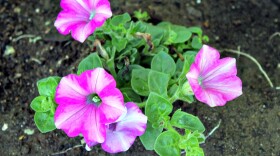A drop in temperature by 60 degrees in just a few days may be damaging to perennials, shrubs and trees. There isn’t a thing we can do about the cold front that came through the Front Range this past week, but there are some things we can do to minimize the potential plant damage.
During the growing season plants cells are full of water. When plants go slowly into dormancy, the cell walls thicken. The water in the cells takes on a form that resists freezing which defines a plant’s cold-hardiness. But when temperatures drop suddenly the cell walls haven’t thickened, and the water in the plant has not converted to resist freezing. The cells expand and can be damaged or killed.
The cold temperatures may have frozen the soil. Usually along the Front Range the soil doesn’t freeze until sometime between Thanksgiving and the Winter Solstice. Keeping the soil frozen will benefit some plants like grafted roses and tender perennials. That is why it is recommended to mound soil above the graft on roses, once the ground is frozen. Adding mulch will keep the soil frozen to avoid the freeze thaw cycle we can experience through the winter.
The weather can warm up and thaw the soil. That is usually when we have wind events. If the soil does thaw the other thing we can do to minimize plant damage is to water. We can have fifty degree days in January after a warm chinook wind. That is the day to water perennials, shrubs and trees. That extra water may help prevent further plant cell damage.
The good news is that plant are resilient. Next spring as plants begin to grow, remember this cold snap. It may be why normally hardy plants are struggling next spring. Or they may not skip a beat. That’s what keeps gardening interesting.






